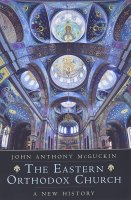The well-known scholar and academic, Professor John McGuckin, has produced an excellent primer on the history of the Eastern Christian churches: her journey, theology, and life. In but a few hundred, well written pages, he takes the reader from the apostolic era to the modern day. Many may shy away from any title which includes the word “history,” but the reader need not fear either an impenetrable presentation or a dull read. McGuckin has produced what should be required reading for any who would like a familiarity with the Orthodox churches way of thinking and practicing as well as the reasons for why the churches practice and believe as they do. This suggested requirement especially is true for those who come from a non-Orthodox tradition as well as those non-Orthodox who would hope to live and minster in Orthodox lands.
McGuckin is no stranger to writing on the history of the Orthodox churches having composed earlier a more comprehensive volume, The Orthodox Church: Introduction to Its History, Doctrine, and Spiritual Culture (2008), in addition to a vast array of other significant, standard writings on the Orthodox churches both as contributor and editor. The attraction of this volume under review is the deft work of a classroom presenter and local church leader who invites the reader to dig deeper via the absorbing content and copious endnotes. While the reader may be tempted to ignore these gem-quality notes—poorly situated at the end of the text rather than at the bottom of each page—McGuckin has provided quite helpful further explanations for both the novice and the inquisitive who want a more complete rehearsal of terms and practices as well as recommended sources.
McGuckin offers a ten-chapter summary of the history of the Orthodox churches from the descent of the Holy Spirit at Pentecost (Acts 2) to the very modern day. He precedes this summary with a prelude entitled, “The Naming of Parts” which orients the reader to how he will use his terms. Following this, he weaves an engaging narrative which explains the theology and practices of the Orthodox churches by addressing the significant issues and introducing the central figures associated with those issues. Importantly, chapter one notes that “if one wishes to find what Orthodox really represents, one need to immerse oneself in its worship before studying it theology manuals” (p. 35). Chapter two, “Shaping Orthodoxy, Mapping Heresy,” lays out the “cardinal foundation stones of ancient Orthodoxy” in four representative areas: “the self-definition of the church through the Bible; its approach to the understanding of the Person of Christ; its growing articulation of the mystery of God as Trinity; and its understanding of its own role in the world”(p. 57). Chapter three, “The Classical Patristic Period,” presents an idea normally foreign to the Western reader. Most Western textbooks look at the Church’s first seven ecumenical councils according to a particular theological challenge of its day. In contrast, McGuckin notes that an Orthodox perspective understands one central theme which ties together all seven: “All of them in different ways turn around the axis of the understanding of the divine role of Christ, especially his saving dynamic as operative in the world” (p. 88). This chapter also acquaints the reader with four significant personages associated with the seven councils Athanasius of Alexandria, Gregory the Theologian, Cyril of Alexandria, and Maximus the Confessor. “The Byzantine Imperial Church” of chapter four not only acquaints the reader with essential concepts such as the symphonia of Church and State and the role of the Byzantine Emperor for Orthodoxy (pp. 125–28), but it also includes a primer on the non-Chalcedonian, Oriental Orthodox churches (pp. 133–35). Chapters five through eight cover the expansion of the Orthodox churches, life under Islam, Orthodoxy under Communism, and the Orthodox diaspora of the twentieth century. The remaining two chapters present a quick sketch of some archetypal men and women of Europe’s twentieth century who lived out Orthodoxy’s “Christ in our midst” (p. 257) and a final chapter entitled “Day-to-Day Life in an Orthodox Church,” which covers what one likely will encounter when entering an Orthodox church and attending her services.
Ever the master teacher, McGuckin adds a postlude and an appendix to his book. The postlude once again demonstrates both the keen eye of the scholar and the pastoral heart of the local church leader as he presents a challenge for the Orthodox in a postmodern environment. Without abandoning the mystery inherent in the Orthodox way, he well makes his case for the relevance of Orthodoxy in the present day, the need to realize that true humanity only can be found in a transcendence “rooted in the stability that our poverty has been made rich by God’s love” (p. 302). He then ends his text near the beginning with an appendix which provides an insightful, Orthodox exposition of the Nicene Creed of AD 325.
By now the journal’s reader is aware that this is a quite positive review. Accordingly, it should come as no surprise that this book is highly recommended for the shelves of the curious, the teacher of Church history, and the local theological library.
